
Fork the System is Al Jazeera’s home for all things food. From Syria to Uganda, Bangladesh to Colombia, we look at how food makes us, a forkful at a time, generation after generation.
His name is Safwan Daaboul. Some know him as Abou Ahmad, but everyone in Idlib calls him the King of Cocktails, or Abou Cocktail. Every day, the 52-year-old wakes up at 7am and puts on the traditional embroidered skullcap, vest, and baggy trousers that have been worn in Syria for centuries. Then he heads across the street to open up his shop, The Hamawi King of Cocktails.
He starts setting up a row of electric blenders and traditional metal juicers – each has its own use because fruits like oranges and pomegranates just taste better when juiced in a traditional press and the electric blenders jump into service to whip up cocktails of softer fruit like bananas and apples.
His two sons, Ahmad and Mohammad, are peeling carrots and apples as customers start to line up. As they wait impatiently for a refreshing drink to start their day, Daaboul cracks jokes and chats with the customers. Well, we are told, they’re not his customers; he prefers to call them “guests”.
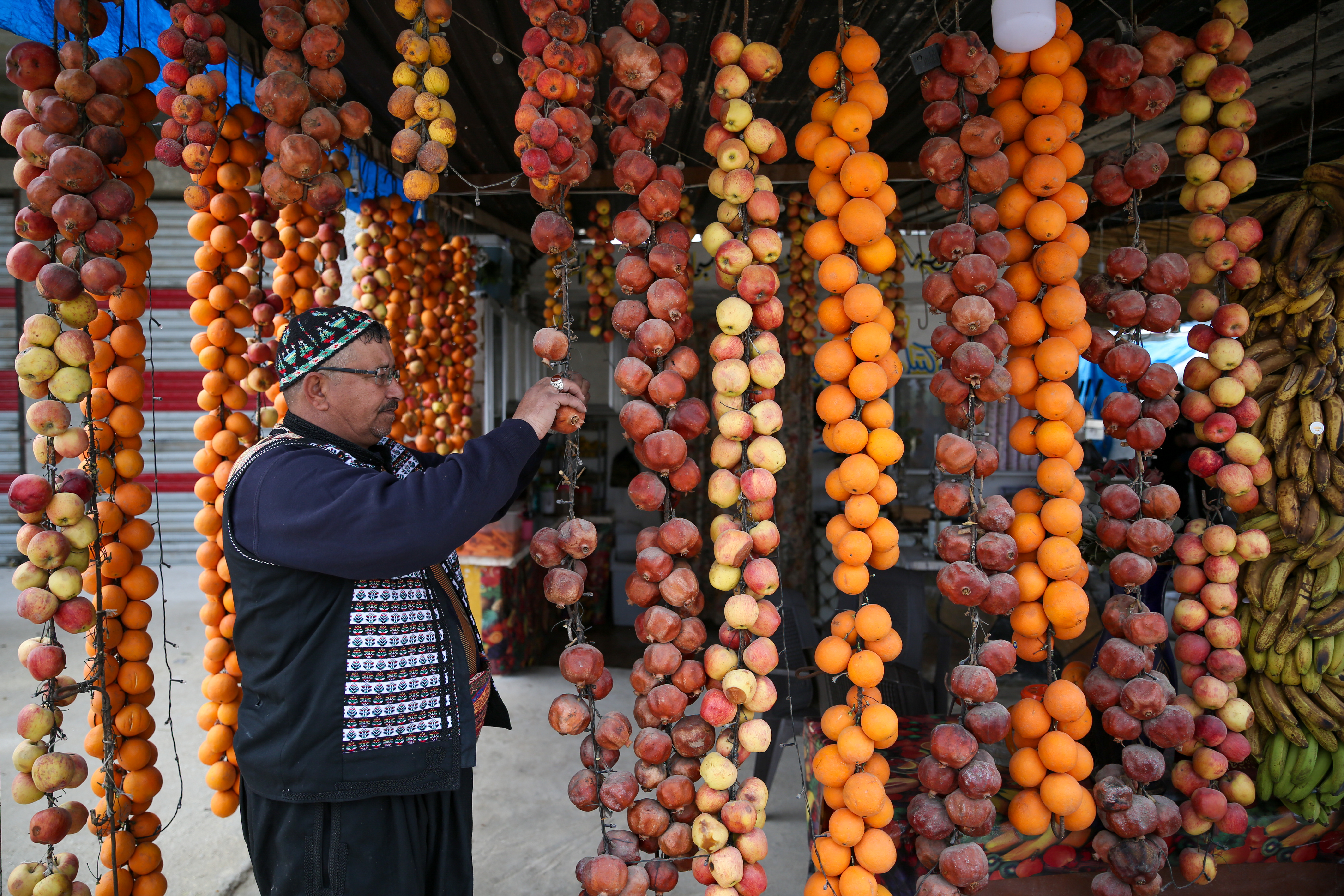
Daaboul’s juice joint is a rare beacon of colour and life in the northwestern city, perhaps better known for the various waves of devastation that have hit it over the past years. The entire shopfront is adorned with hanging strings of apples, bananas, pomegranates, peaches, and oranges, swinging gently back and forth.
And they are not plastic fruits, nor are they there just for show, Daaboul air-dries his fruit.
“I can dry them for months,” he says as he detaches a few yellow apples. “That way you have a stronger essence of the fruit, and the juice will taste much better with a stronger flavour.”
Only carrots, cherries and strawberries go in the fridge.
The juice purist
Juice shops and their elaborate concoctions are popular across the Middle East, especially on hot summer days.
In Lebanon, many opt for a glass of “cocktail sha’af” (which translates to a “cocktail with bits”), a frosty glass stuffed full of chunks of strawberries, melon, berries, bananas, and other fruit, and juice – often strawberry – topped with rosewater, ashta (clotted cream), honey, and sometimes sliced almonds or pine nuts.

In Egypt, the fakhfakhina has a scoop of ice cream added to the top of a glass bursting with juice and chunks of fruit, with an emphasis on mangoes, a fruit that Egypt grows profusely and which has a near-cult status. Whipped cream, nuts and other toppings may appear, depending on the juice shop’s recipe.
But Daaboul is somewhat of a juice purist. “Absolutely not, none of that,” he says. He will, however, use milk when making a smoothie, but nothing else. “It all ruins the taste of the fruit,” he insists.
There is some mixing happening though, in fact, Daaboul started what has become his lifelong obsession with juice when he started mixing different fruit juices together while working in his father’s shop as a child. He has what he calls a “traditional” cocktail, and he is not shy about encouraging customers to try the mix of oranges, peaches, apples and bananas.
If a customer has a combination in mind but they’re not sure about it, Daaboul will let them sample it first in a small tasting cup. But the Juice King cannot help but judge them a bit.
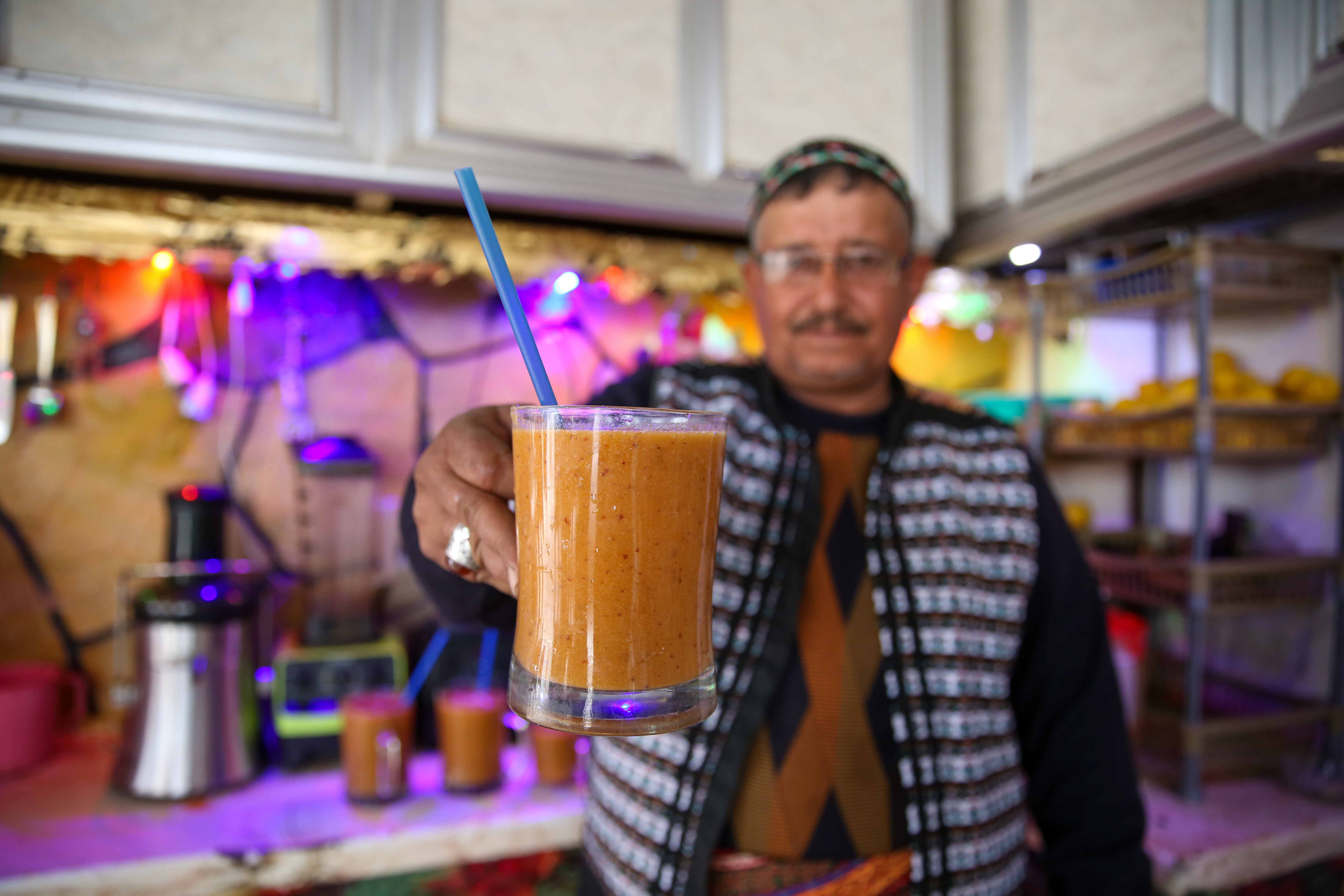
“Some people will want a cocktail without bananas, even though you obviously have to have bananas in your cocktail,” he says, while preparing an orange and carrot juice mix. “Someone also once wanted a banana blended with orange juice,” he shrugs, “You just have to accommodate their needs.”
His favourite drink is a smoothie with apples, mangoes and milk.
“It’s so delicious,” he says.
The local icon
To say the Juice King’s colourful joint sticks out like a sore thumb on a cloudy day in Idlib city would be an understatement, and he is now known for miles around.
Passers-by, pedestrians and drivers, regularly stop by just to take a look. Daaboul welcomes them to try a juice or have a fruit salad, free of charge.
He loves talking to his guests but says his fondest moments are when people passing ask him if the fruit hanging outside the shop is real. It happens more often than one would think.
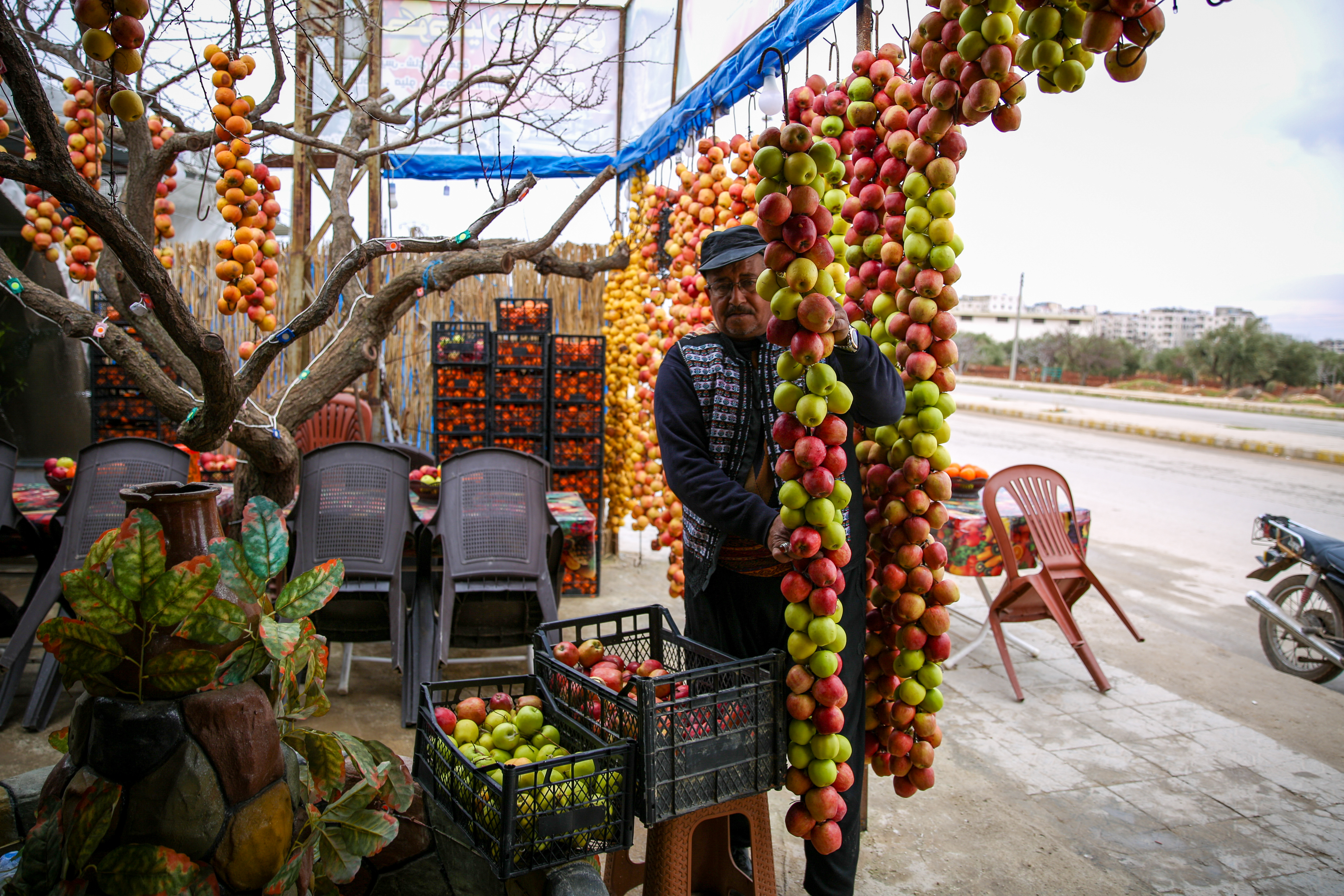
One day, while Daaboul was picking fruit to juice, a passing driver hit the brakes and slowly reversed towards the shop. The Juice King put down his selection, thinking something was wrong and the driver needed help.
Instead, “He looked at the fruit and asked, ‘Are those real?’” Daaboul says, laughing.
Another time, a young couple came up to the Juice King briskly, they were on a mission.
“So, my wife and I decided to bet on whether those fruits are real or not,” the husband said anxiously. After Daaboul gave them an apple to taste, the man’s wife laughed and told her husband: “Now you owe me $100.”
“Thank you!” she said happily to the Juice King.
At night, the juice joint is one of the few places on the block with the lights on.
Day or night, the unusual shopfront is easy advertising. Customers take pictures of the hanging fruit and send them to friends and family. Two young men take selfies in front of the hanging fruit orchard while holding their chilled glass of mixed fruit juice.
The juice joint is an oasis for many in northwestern Syria, where more than four million people from all over the country live huddled together in bitter economic conditions.
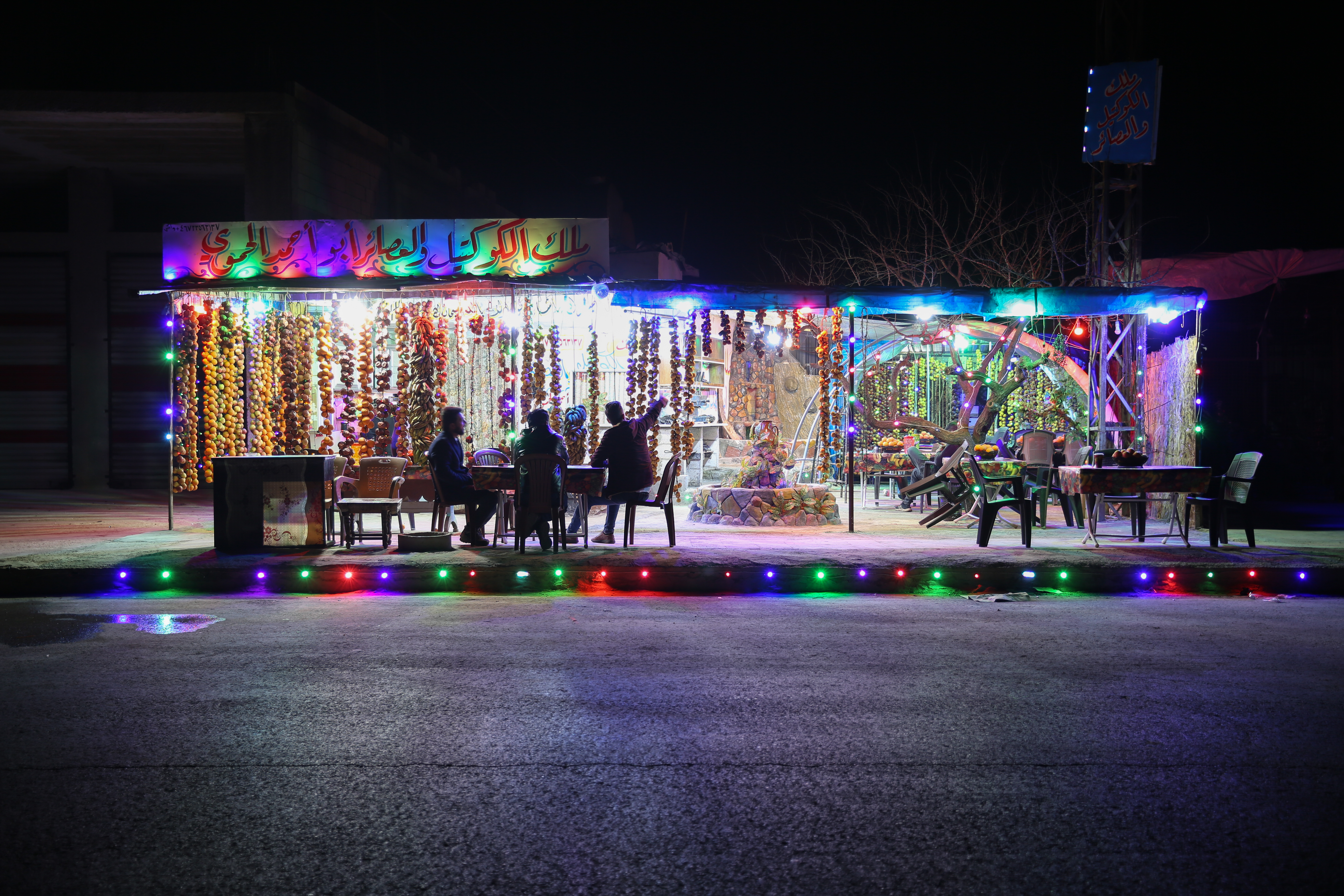
According to the United Nations, 97 percent of the population of the region lives in poverty, while eight in 10 people rely on food assistance to get by amid eye-watering, soaring food and fuel inflation. Two-thirds of the population are internally displaced Syrians, many living in tented settlements in even more abysmal conditions.
“I want guests to take it easy, relax, and have a good time when they visit,” Daaboul says.
“I really feel joy from the bottom of my heart when I see people coming to have a drink and spend time here.”
On Fridays after communal prayers are over, things get really busy, the place jam-packed with customers coming in for some thirst quenchers. So much so that Daaboul encourages customers to pick up their orders in the morning before prayers. It’s even busier during the holy month of Ramadan.
“Everyone orders bottles of juices or cocktails for their Iftar meal,” Daaboul says, adding that he welcomes customers for their pre-dawn Suhoor meal before observers start their fast.
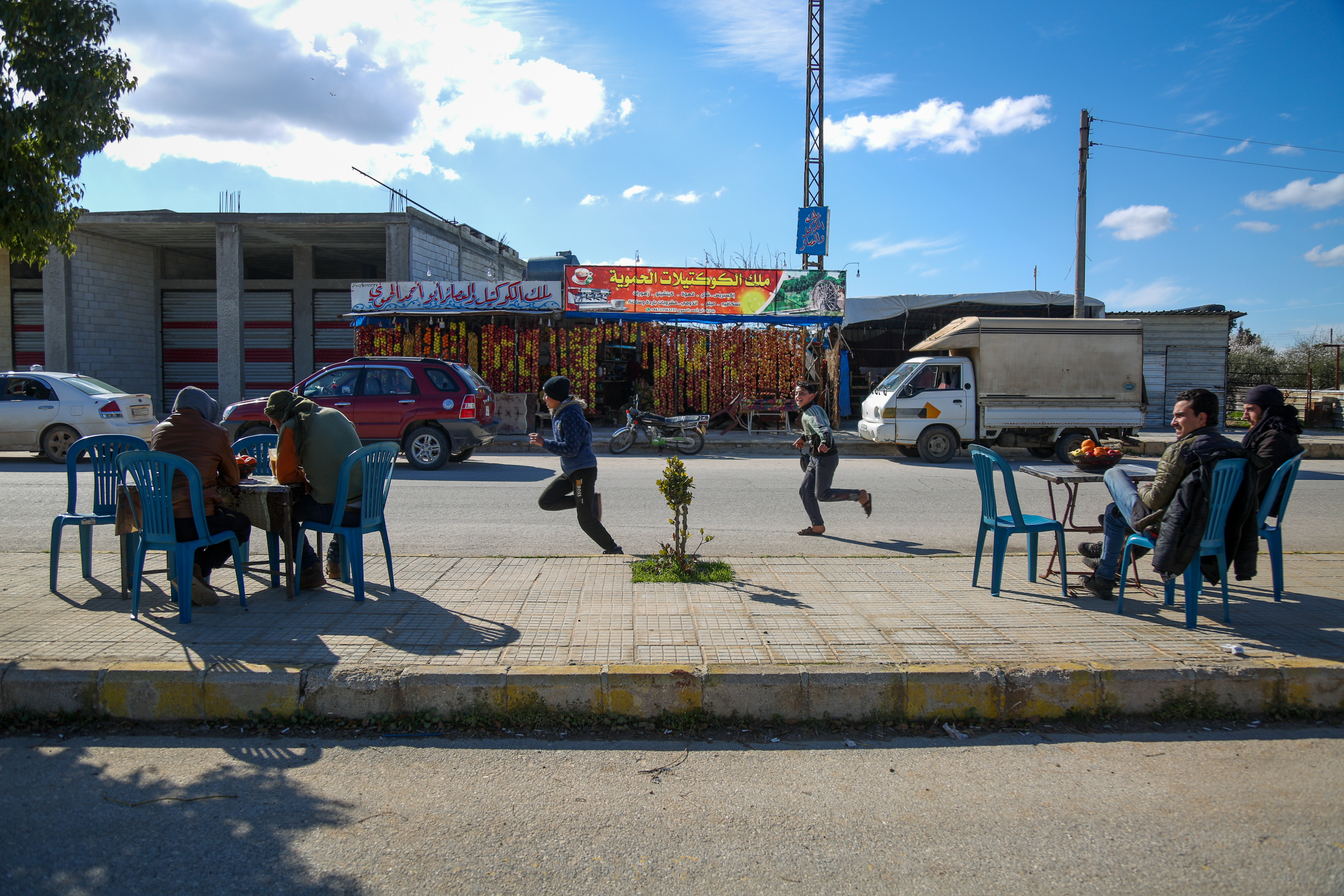
“When they have their banana and milk smoothie and their toasted cheese sandwich at my place, they never go hungry or thirsty throughout the day.”
The survivor
Juice isn’t just business for Daaboul, it is a passion bordering on obsession and he still spends more time at his shop than at home.
It is a passion he has harboured for 40 years, 10 of which were spent amid Syria’s civil war.
“I’ve been in this industry since I was born,” Daaboul tells Al Jazeera over the sound of a blender as he prepares an apple and carrot juice.
He grew up in the produce shop that his father and grandfather ran in his native Hama, helping them sell, sort, clean and stack produce. He soon developed his hobby-cum-passion of blending and juicing different combinations of fruit.
His first shop was a villa near the banks of the Assi river in Hama, home to the iconic waterwheels of Hama that soar seven storeys above the water’s surface. The wheels had watered the city and nearby fields and orchards for centuries, and it was into those orchards that Daaboul was able to go, selecting the fruit he needed for the shop and making sure everything was as it should be.
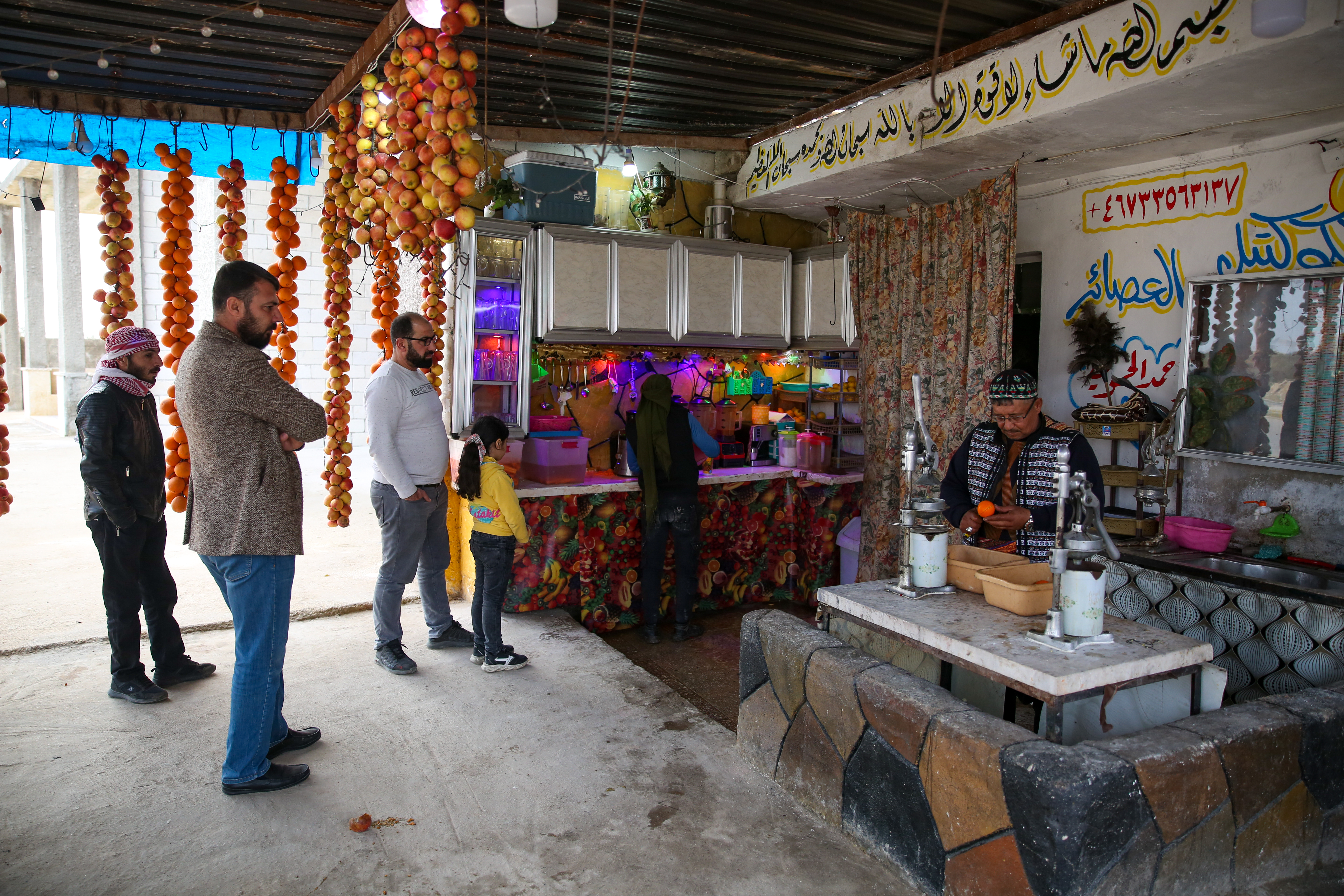
Life was picture-perfect – until war flared in Syria and the violence hit close to home.
Daaboul has energy and positivity that lifts his guests’ spirits, some liken him to a favourite uncle or grandfather, and he generally refuses to talk about the troubles he has faced in life. His face takes on a set expression as he tells us how he got to Idlib.
While he was at work in the villa by the Assi one day in 2013, he was told that his brother had been killed by shrapnel that had pierced his body. “I kept the shop open and kept taking orders,” Daaboul says with a deep sigh. “I was sad, but I appeared fine. People would have thought I lost my mind if they knew.”
He had wanted to stay strong for his mother, who he says is elderly and was heartbroken by the news. The following day, he closed the shop to be with his family.
The family decided to move an hour north to Maaret al-Numan, in the south of Idlib province. Daaboul found a pleasant spot in a public park where he was able to set up a new shop.
“Families would bring their kids to play on the swings and slides nearby,” he recalls fondly.
But then Syrian and Russian air raids intensified across southern Idlib in 2018 and people started to move away. “Almost everyone had left the city,” he says. “But I just stayed open. People started taking pictures and sharing them online saying: ‘Abou Cocktail is still here,’ to encourage people to come back.”
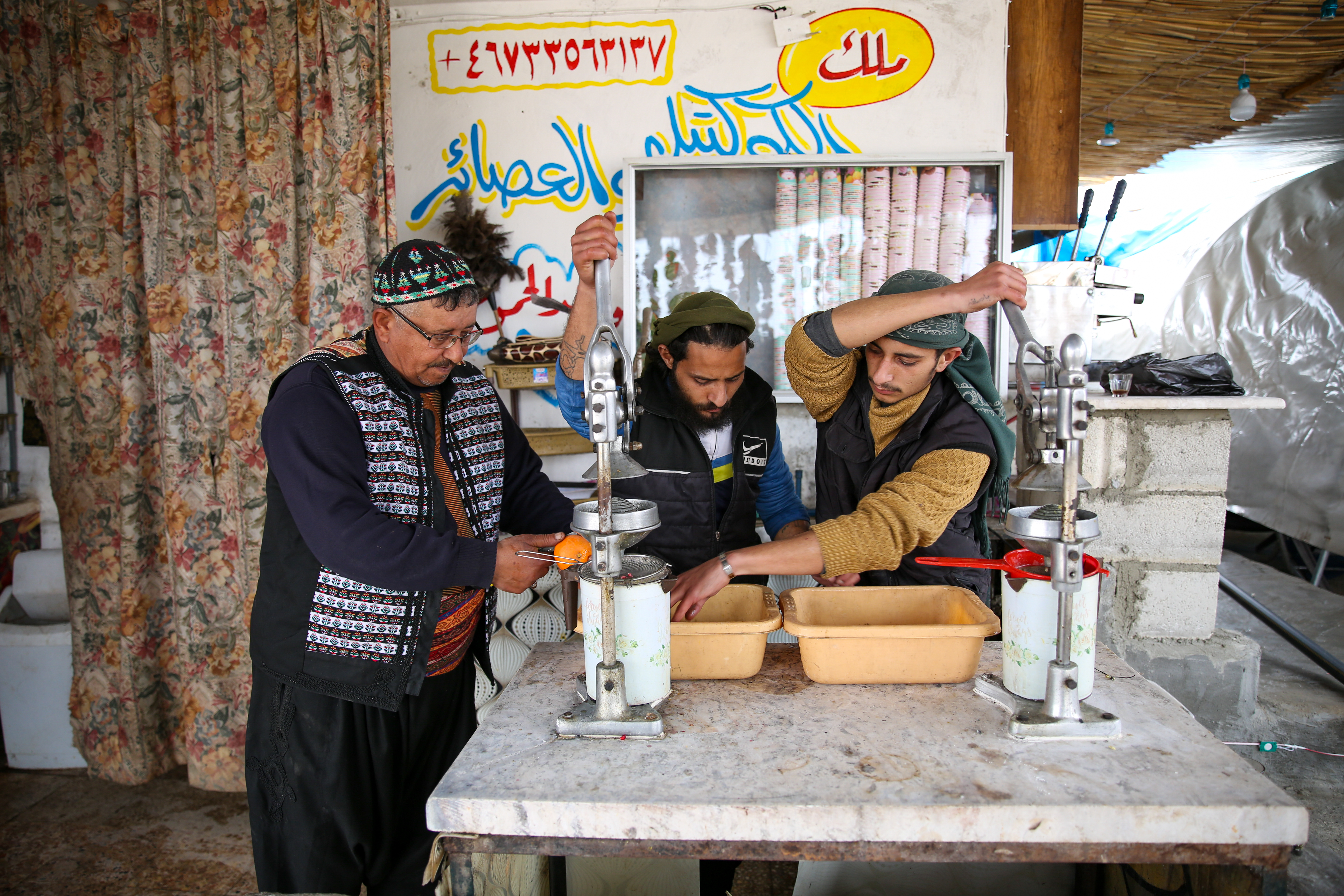
He didn’t want to leave, but a year later his hand was forced.
Daaboul was preparing drinks for two thirsty customers one day, and they could hear shelling getting closer and closer. Then it seemed to be right down the block, and he told his customers to run into the building across the street. “By the time we started running, the shop blew up, fruits were flying everywhere. Everything was destroyed.”
Abou Cocktail survived, but only just.
Shrapnel pierced his hip and one of his legs. He hobbled home, covered in soot and dust. His family saw him approaching the entrance from the balcony and started screaming, thinking he was dying.
“The situation wasn’t bearable any more,” he says. “We heard 200 or 250 rockets in the area. We had lost hope at that point and had to leave.”
The optimistic patriarch
Daaboul admits that it has been heartbreaking at times.
“When you work really hard to set up a place, build its reputation, and then have to leave it, it’s like you’re always having to go back to square one,” he says. “You then have to find new customers who will hopefully become regulars. It can get very tiring of course.”
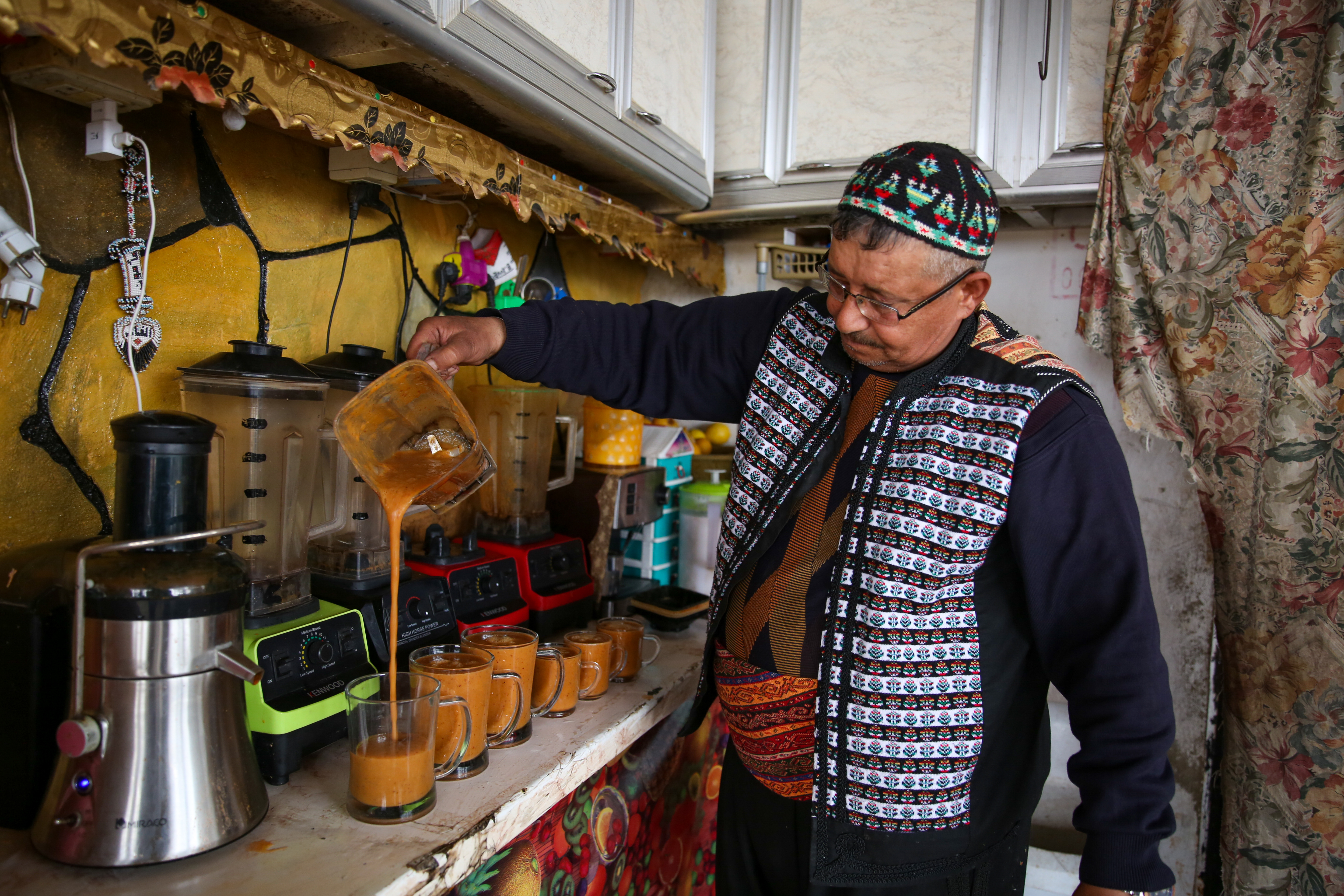
Despite everything, Daaboul remains the optimist; just get him started on his favourite topic, juicing, and off he goes on elaborate tangents.
He still insists on using local produce in this third city he now calls home, and not just to support the local economy. “Syrian fruits can be dried for juicing, Turkish apples barely last four days before spoiling,” he says. “Everything grown in our country is delicious.”
Daaboul likes to visit the orchards himself, try the fruit and meet the farmers before committing to a supplier. “In Hama, my friend has an apple orchard and I was committed to it every year,” he explains. “He knows, every season, that I will buy my supply from him.”
Now in Idlib, he gets his fruit from al-Janudieh, a village about an hour west of the city right by his old friend the Assi river as it winds its way north.
Daaboul hopes that, this time, his setup will last. He has regulars from around the province and a Facebook page to promote the shop, which he recently expanded to serve coffee and tea to his guests. Customers come from all over, from towns and villages around the northwestern province, just to stop in for a drink.
And he plans to innovate with less traditional things, he explains, saying that he will soon be serving affogatos – Italian desserts made of a scoop of vanilla ice cream doused with a shot of espresso coffee.
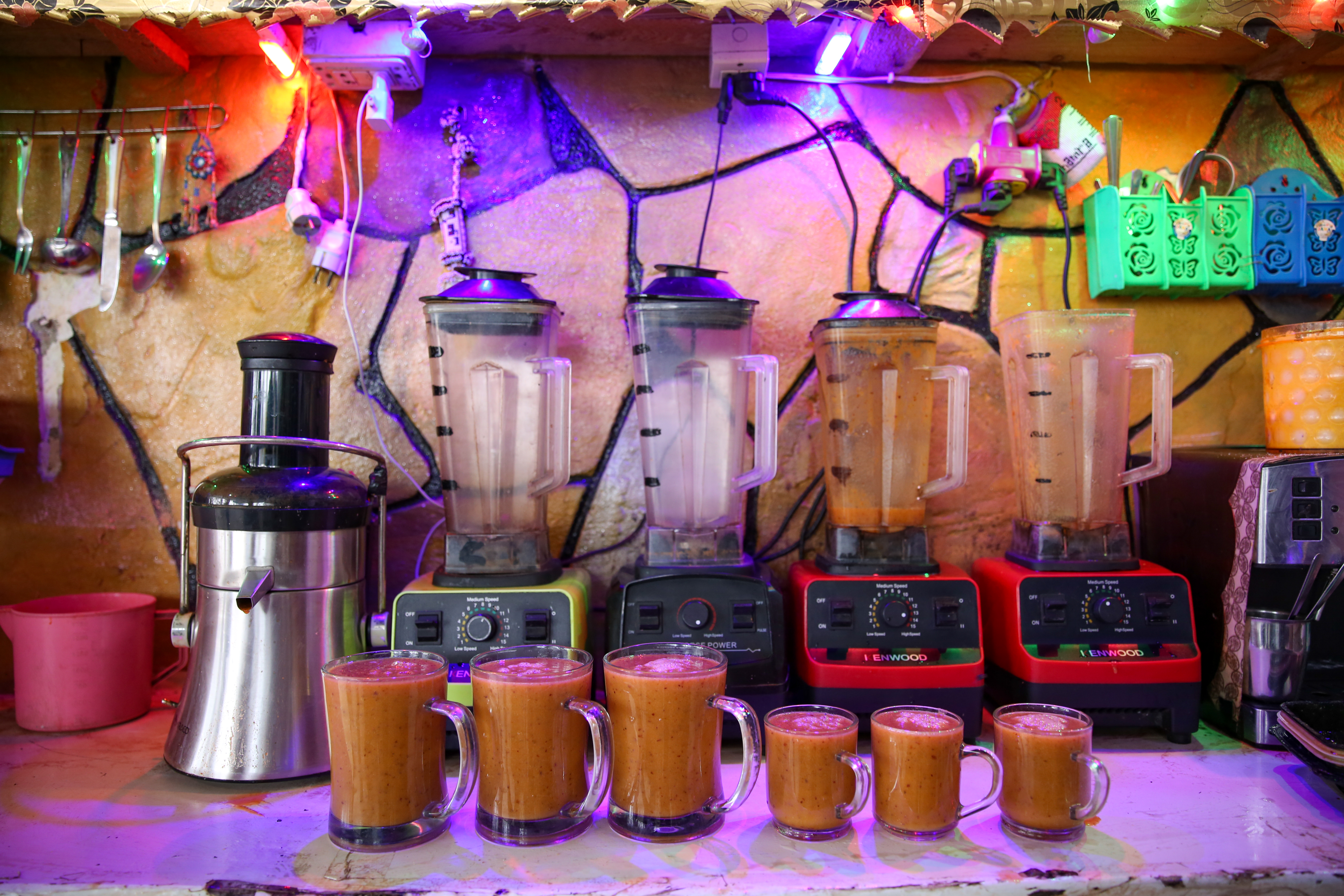
His sons, Mohammad and Ahmed, run around tirelessly, whipping up drinks and serving customers. They are the future, Daaboul says, insisting that the shop will stay within the family.
“Giving it to a stranger? I don’t want anyone to ruin my reputation,” he says, seeming offended at the idea. “No, I’ll teach my kids everything instead.”
By now, the Juice King feels, he has taught them enough that he can take breaks during the day to get other things done or to relax a bit.
But he still makes the business decisions, one of which was to keep his prices lower than other juice stands. As times get tougher in Idlib, he doesn’t want to alienate the customers he considers guests, friends, family. “I had to increase my prices of a large drink from seven Turkish liras to 10,” he explains. “Other places sell them at 15 or even as high as 20. I keep my profit to a minimum.”
The Turkish lira is used in this part of the country because it is more stable than the Syrian lira and most imports are from Turkey. Ten Turkish liras are less than a single US dollar, but still a luxury for the vast majority who earn less than $2 daily. Daaboul often won’t charge for children’s drinks and offers discounts to wounded people who have even fewer work opportunities.
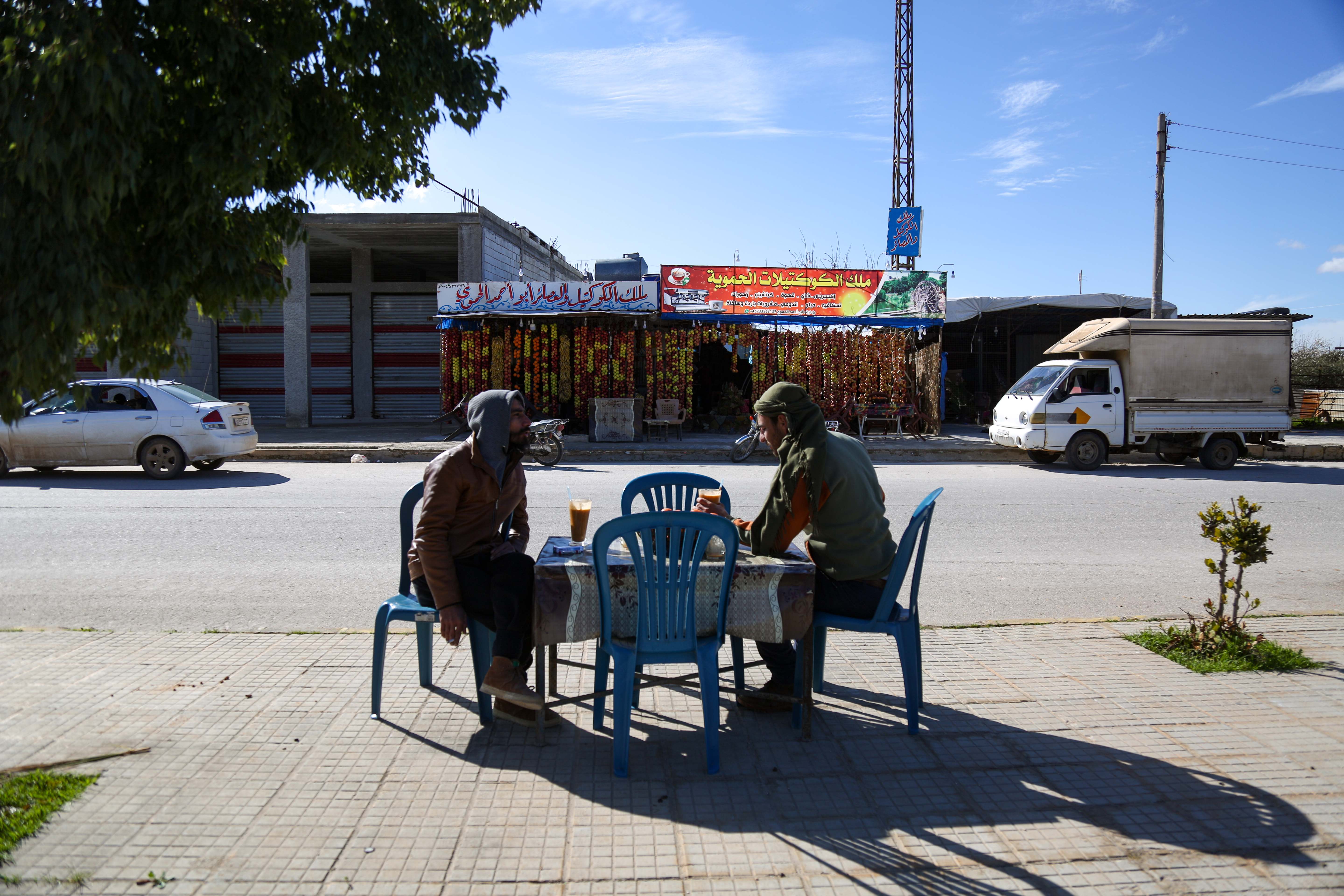
“If someone comes in and stays for a long time, just to have a good time, play with their kids, and take pictures with family, of course, that’s fine,” Daaboul says as he bottles another litre of fruit cocktail juice.
“If I see them able to take it easy and forget about their daily troubles here, then I’m happy.”
Ali Haj Suleiman reported from Idlib, Syria. Kareem Chehayeb reported from Beirut, Lebanon.







